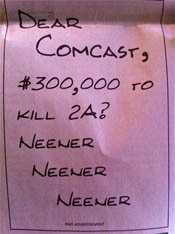In a reminder of the power embodied in massive corporations like Comcast, Seattle Mayor Mike McGinn is facing a challenger buoyed with sizeable contributions from the nation's largest cable and Internet company.
Why is Comcast so interested in defeating Seattle's mayor? Like a playground bully, it comes down to both payback and a warning to others. Comcast is serving warning to other big city mayors: try to create competition and we'll take you down.
Though over 400 communities have publicly owned networks serving local businesses and/or residents, the vast majority are in small or medium size towns. Except for Seattle and a recent Baltimore announcement, large cities have not built networks offering services to non-public entities.
Seattle has long considered using its significant fiber resources to offer a real alternative for local businesses and residents but the city owned electric utility has not been as enthusiastic as others... like the Chattanooga Electric Power Board. That's right - Chattanooga, Tennessee, has the nation's most impressive fiber network and the City built it in the face of multiple lawsuits from Comcast.
Seattle opted instead to share its substantial fiber network assets with a new firm, Gigabit Squared that is starting to work with some cities that have fiber assets to deliver services to residents and businesses.
The plan in Seattle is to create a large pilot project in at least 12 neighborhoods offering Internet service at speeds far faster than Comcast but at a lower price. It was announced in late 2012 and will apparently start offering connections in early 2014.
In the meantime, Comcast has donated heavily to Seattle Mayor McGinn's rival Ed Murray at a time when many expected the Mayor to already have a difficult race. From the Washington Post story:
Comcast's donations to political action committees (PACs) suggest Comcast has poured dramatically more resources into defeating McGinn. The Broadband Communications Association of Washington PAC, which received 94 percent of its 2013 contributions from Comcast, donated $5,000 to the group People for Ed Murray less than a month after Gigabit Squared's pricing announcement. That was the PAC's largest single donation. Unsurprisingly, People for Ed Murray has made significant expenditures supporting Murray's candidacy. The Web site of the Broadband Communications Association of Washington also lists [Comcast Executive] Janet Turpen as president-elect.
Comcast also donated $5,000 to the PAC called the "Civic Alliance for a Sound Economy," or CASE, whose largest expenditures were donations to People for Ed Murray, to the tune of $52,500 -- over half of the money spent by the group according to the most recent disclosures online. Their second largest expenditures was $10,000 to People for a New Seattle Mayor, a group opposing McGinn's reelection.

This is nothing new to Comcast and if anything, suggests a more modest approach than we have seen elsewhere. We have long covered the fight in Longmont where Comcast first broke records by spending $240,000 to defeat a referendum restoring local authority to build a network. Comcast then doubled down two years later for the same question, spending over $400,000 in the final tally and getting crushed in the process. That led to this great ad in the local paper. Now Longmont is building one of the most impressive fiber networks in the nation.
Seattle mayoral challenger Ed Murray's spokesperson has said he will continue to honor any agreement with Gigabit Squared though he has not made broadband policy an issue in the race and has no discussion about this important policy matter on his web site.
Just as Comcast lost in Longmont despite spending big, its candidate may not win in Seattle. But that is only part of the point. This issue goes well beyond Seattle, as the Washington Post's Andrea Peterson rightly examined in her concluding words:
A loss for McGinn on Tuesday probably won't mean the end of Gigabit Squared's work in the Seattle metro area, though it could curtail Gigabit Squared's plans to expand to other parts of Seattle. More importantly, though, if Comcast's donations help Murray defeat McGinn, it will send a powerful message to mayors in other American cities considering initiatives to increase broadband competition.
Mayors should not be cowed by this intimidation. The vast majority of our communities need better access to the Internet and with the right investments, we'll have faster, more reliable, and less expensive networks. This is the nightmare scenario for both Comcast and some on Wall Street that praise its monopoly:
We're big fans of the firm's Video and High-Speed Internet businesses because both are either monopolies or duopolies in their respective markets. Further, we believe that both services have become so sticky and important to consumers that Comcast will be able to effectively raise prices year after year without seeing too much volume-related weakness.